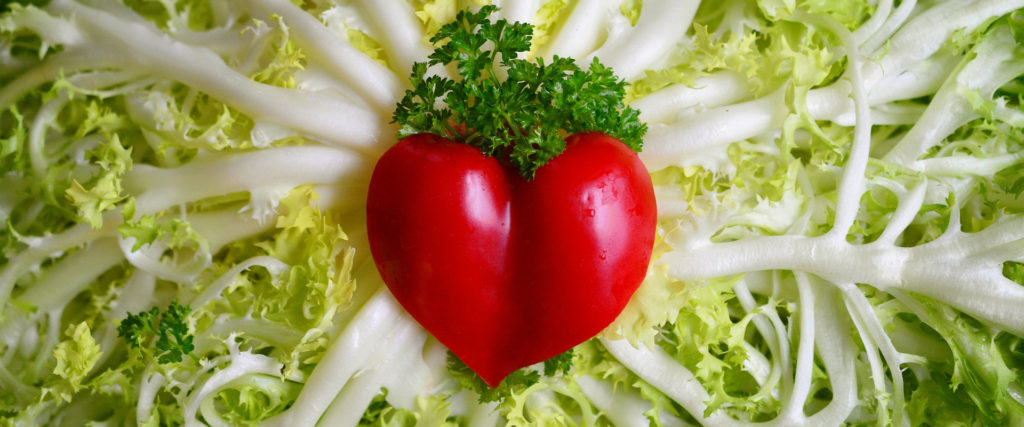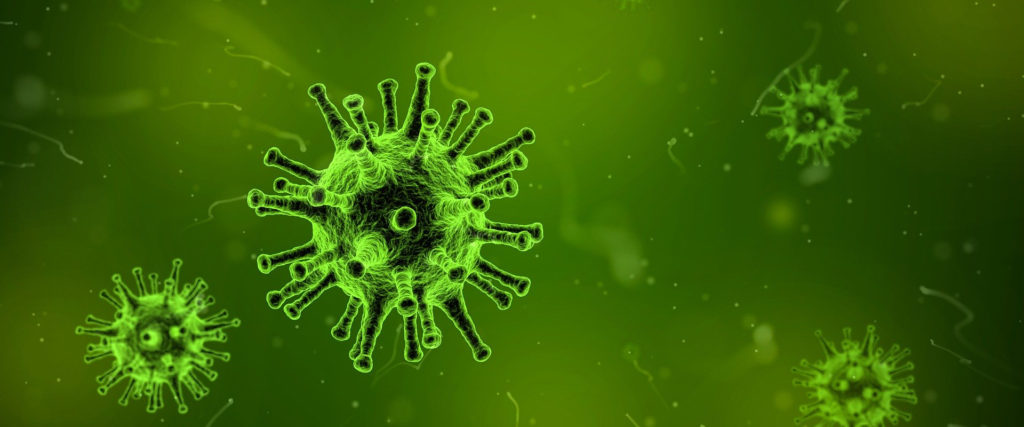Written by Aleha Pillay and Cetana Wong
In continuation of our theme of vegetarianism, health and the environment, this article explores the effects of a vegetarian diet on health and well being.
There are numerous health risks that have been associated with meat production and consumption, these include[1]:
- Saturated fats found in meat contributing to diabetes and the build up of arterial plaque
- Meat proteins contributing to the formation of carcinogenic compounds in the body
- Increased oxidative stress which results in cell and tissue damage
- Antibiotic resistant pathogens caused by the antibiotics administered to livestock
- Transmissible prion diseases (Creutzfeldt-Jakob or Mad-cow disease)
Additionally, red meat contains additives and contaminants from processing that are carcinogenic, including polychlorinated biphenyls, cadmium and antibiotic residues. There are also established links between the consumption of red meat and an increased risk of developing chronic diseases, namely Type II diabetes, cardiovascular disease and cancer[2].
Metabolic diseases – Cardiovascular, Stroke, Diabetes

Cardiovascular disease (CVD) is the leading cause of global mortality, estimated to be responsible for 46% of non-infectious disease deaths as of 2018. CVD is generally associated with lifestyle factors such as low consumption of whole plant foods, high consumption of fatty/processed foods and lack of exercise[3].
Studies showed overall that non-meat eaters were less likely to report receiving long term treatment for an illness and had lower incidence of diabetes. It was also found that vegetarians are 24% less likely to die from ischaemic heart disease, attributed to their lower body mass index, blood cholesterol and blood pressure[4].
Meat eaters also have an increased risk for cardiovascular diseases, including strokes (ischaemic and haemorrhagic), coronary heart disease and heart failure. High consumption of processed and unprocessed red meat was found to be positively associated with an increased risk of stroke (up to 13%) and heart failure (as high as 24%)[2].
Cancer

While cancer is still a diverse and complex disease, factors that increase the risk of developing cancer have been identified. Cooking meat at high temperatures can produce heterocyclic amines and polycyclic aromatic hydrocarbons, both of which are considered carcinogenic. Additionally, glycotoxins are produced when cooking, which have been linked to increased activity in oxidative and inflammatory processes[2].
There have been a number of studies linking increased cancer risk to consumption of both unprocessed (more than 100g a day) and processed meat (more than 40g a day). Of the cancers studied, prostate, colorectal and oesophageal cancers were found to be most associated with meat consumption[2].
Hormonal and Drug Contaminants

Approximately 80% of livestock are treated with veterinary drugs, the most important of them being antibiotics administered to prevent or treat diseases. Antibiotic use in raising livestock is to maintain the quality and efficiency of growth, animal wellbeing, economic production, carcass quality and public health. In some cases they can counteract the physiological burden of prolonged exposure to low levels of disease and bacteria, thus suggesting that they can act as a growth promoter for the animal[5].
These drugs are usually metabolised and excreted from the animal, however, traces remain in meat which cannot be completely eliminated, even by cooking. There are concerns that prolonged exposure to these compounds can lead to toxic symptoms[6], such as cancer, liver injury and reproductive disorders. Other side effects include the development of allergies towards commonly used antibiotics, an example being penicillin. Alarmingly, this also results in the generation of strains of antibiotic resistant bacteria[5].
According to the EU Health and Food Safety Commission,
“[Antimicrobial resistance] has a direct impact on human and animal health and carries a heavy economic burden due to higher costs of treatments and reduced productivity caused by sickness.”
It is estimated antimicrobial resistant pathogens are responsible for approximately 25000 deaths per year in the EU alone and costs 1.5 billion euros a year in healthcare costs and productivity losses[6].
Zoonoses

Livestock farming has changed drastically in the past century with the introduction of factory farming, exchanging previously more ethical farming practices with practices designed purely for economic profitability. This happens at the expense of the animals and exposes the public to associated health risks[7].
E. coli, Salmonella and Campylobacter are bacteria that can cause food poisoning in humans, which is potentially fatal. These bacteria species survive and multiply in livestock and can spread rapidly between animals under crowded factory farming conditions. The use of grain in feedlots poses a particularly high risk for E. coli infection and transmission between animals, as the feedlot is a high density area and grain promotes E. coli growth in the hindgut[8].
A big risk factor in Campylobacter transmission is the practise of ‘thinning’ where a percentage of birds are removed for slaughter early, while the remainder are left to grow. Infections can be introduced during this time, due to increased activity in chicken houses. Prior to slaughter, flocks are not fed in order to reduce the risk of faecal contamination to the carcasses. However, due to the resulting stress from lack of food bacterial growth is exacerbated and infections are more likely to occur[8].
These factors, coupled with lengthy transport time and poor, crowded conditions prior to their slaughter, can further exacerbate bacterial growth and transmission. Contamination occurs when slaughtering the animals if the meat is tainted with faecal matter. This is particularly problematic for minced or ground meat as it has a large surface area to house microbes and may be derived from multiple cuts from different animals[8].
Changing behaviour, expanding human and livestock populations, and an increase in global travel and trade are also linked to increased disease emergence and can potentially lead to pandemics. Analysis of a number of human pathogens found that 58% of pathogen species were zoonotic (capable of being passed between human and non-human species)[9].
A study revealed that 26% of human pathogens are capable of infecting both domestic and wild animals. Interactions between humans, or livestock, and wild animals establishes cycles of disease present in these populations. This increases the risk of transmission of potential pathogens. Livestock become amplifiers and hosts to pathogens which can evolve and infect humans. The continual expansion of agricultural territory, driven by increasing population as well as economic and technological development, creates novel, intensive interactions between humans, livestock and wildlife. This has been implicated as a driver for emerging disease events and pandemics[9].
Longevity

People report feeling more invigorated and lively when they make the switch to a more plant-based diet. There is evidence that links decreased meat consumption and prolonged longevity. Comparisons of studies documenting this phenomenon indicate that even in a short time (less than 17 years) of adopting a meat-free diet, participants experienced increased longevity (3.6 years). Prolonged maintenance of this diet (more than 20 years) can further decrease mortality[1].
Related living habits may also play a role. Vegetarians are more likely to avoid cigarettes and alcohol, maintain higher levels of physical activity and generally have a greater awareness of their personal health which also contribute to overall longevity. Foods that replace meat, such as legumes, soy products, nuts and vegetables, may also be protective against fatal diseases. One study reported that a higher consumption of green salads was linked with a decreased mortality risk, while another reported a reduced mortality risk from coronary artery disease associated with an increased consumption of nuts[1].
What you eat affects your state of mind

Your brain is constantly maintaining the bodily functions you need to survive, thus it requires fuel. It comes as no surprise then, that the type and quality of food that you consume has a direct affect on your brain’s capability to function[10].
The link between the brain and gut bacteria is a relatively recent discovery. It had long been suspected that our health was in some way affected by the diversity and makeup of the microorganisms living in our intestines, known collectively as our gut microbiota. They are responsible for absorbing hard to digest nutrients, producing vitamins and defending against harmful bacteria, highlighting the critical role these organisms play in the maintenance of our health and the development of disease[11].
This extends to mental health as well, with recent evidence to show communication between your microbiota and brain, helping to maintain brain health. Experiments in mice found differences in brain structure when comparing mice with reduced microbiota to those with a normal functioning one. Indeed, the evidence is increasingly indicating that these microbes are capable of producing important neurotransmitters, such as serotonin, and directly affecting the brain[11]. As such, there are also efforts to understand how best to maintain this microbiota to improve one’s mental health.
Studies have compared different diets to determine the effects of food on the gut-brain connection, contrasting more traditional diets, such as a Japanese or Mediterranean diet, with a more typical “Western” diet. They found that the risk of developing depression dropped by 30% for the participants that ate a traditional diet (e.g. Japanese or Mediterranean diets), attributed to the higher consumption of whole plant foods and unprocessed grains, and a lower consumption of meats and dairy products. There was also a noticeably lower proportion of processed foods and sugars in traditional diets, along with a higher number of fermented foods which act as probiotics[10].
Of course it may not be possible to completely eliminate meat from one’s diet. But consider reducing your consumption of meat and increasing your consumption of plant-based foods for the benefit of both your physical and mental health.
We will be continuing this series with our next article about vegetarianism and its ties with the environment, so stay tuned!
Works Cited
[8] Compassion in World Farming, World Society for the Protection of Animals. Zoonotic diseases | Compassion in World Farming 2013. https://www.ciwf.org.uk/research/animal-diseases/zoonotic-diseases/ (accessed September 2, 2020).
[10] Selhub E. Nutritional psychiatry: Your brain on food – Harvard Health Blog – Harvard Health Publishing 2015. https://www.health.harvard.edu/blog/nutritional-psychiatry-your-brain-on-food-201511168626 (accessed September 5, 2020).

